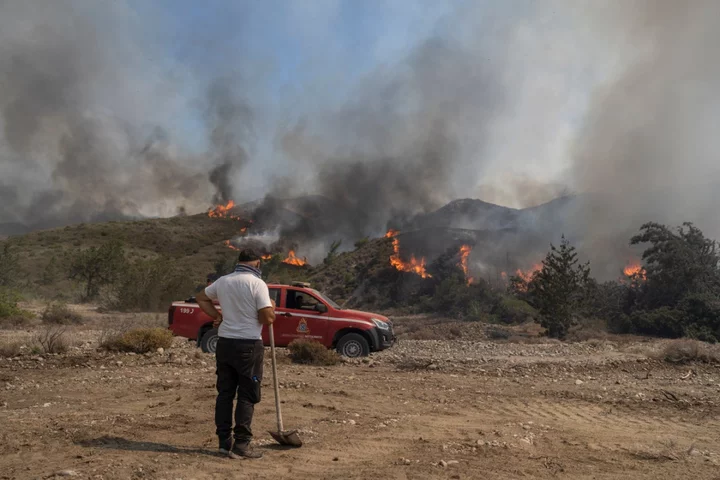
Five Things We Know About Niger’s New Military Leader
A day after General Abdourahamane Tiani declared himself Niger’s new leader, a picture is emerging of the little
2023-07-29 18:48

China Moves to Bolster Consumer Industries, Grow Fledging Bourse
China issued more measures to bolster economic growth, including a plan to boost consumer industries and steps to
2023-07-29 15:59

‘The season is over for us’: Greece prays for tourism as islanders sift through the ashes
“And just like that, it’s gone”, 75-year-old Elpida Voyatzisaid said softly, standing outside her home in Kiotari – a town left devastated by the wildfires that raged for 10 straight days on the island of Rhodes. Where once stood land devoid of all but a single tree, Elpida and her husband have spent the past 20 years nurturing a bountiful farm, its acres of trees and vines bursting with grapes, olives, pomegranates and figs. While the flames stopped just a few metres short of her home and holiday apartments, behind her lay the burnt-out husks of close to a dozen houses overlooking the beach – the final point in a path of destruction forged by the fire at terrifying speed. The inferno’s rapid advance forced the mass evacuation of British tourists from resorts in the island’s southeast – with accounts of holidaymakers fleeing for miles along beaches in the middle of the night leading tour operators to cancel thousands of people’s trips this week. But with the blazes now largely under control, and the damage confined to just a handful of hotels, the fear for many residents is that tourists could be unnecessarily hesitant to visit the island – whose economy is almost entirely fuelled by the summer holiday trade. For those in the few villages hit by the fire, such as Kiotari, the impact is clear. “What a disaster,” said Elpida, adding: “We told [our rental apartment visitors] not to come, because what are they coming to? To see what sights? It’s going to be depressing for them. The tourist season is over for us.” Her daughter, Fedra, who emigrated from Canada with her husband to take over the farm just months ago, hopes that with regenerative practices it could take five years – rather than another 20 – to regrow. Her other income stream, a school she opened on the farm to teach locals lessons in English and outdoor education, has also been destroyed in the fire. “People’s livelihoods, they’re literally in ashes,” said Nicole, a 44-year-old wedding planner, whose home was among those in Kiotari reduced to rubble and embers by the fires. “If you have money, you can regain everything. If you don’t have money, I don’t know where you will start.” Pointing to the three months of €534 in support for those impacted by the fire announced by Greek labour minister Adonis Georgiadis, Nicole said of the wider community in Kiotari: “So we’re going to live on €1,500 euros for a family of five.” “We’re grateful for any help,” she added, “but it won’t sustain what people have lost.” Because of the mass evacuation and decision by tour operators to cancel holidays this week, those living in areas untouched by the fire are also feeling the squeeze, and are anxiously hoping visitor numbers will bounce back rapidly. Most businesses make their money for the year during the six summer months, with July and August the season’s peak, and those spoken to by The Independent in towns in the south of Rhodes without exception feared a difficult winter could lie ahead. “Rhodes is a huge island, but everyone is reliant on tourism,” said Antonis Chatzimichalis, a 21-year-old University College London Master’s student from the town of Archangelos, who had been volunteering at the evacuation centre set up there for displaced tourists and locals. “It’s like a chain – the suppliers, the local people, restaurants, everyone” needs tourism. Argedis and Katarini Ganotakis, aged 63 and 56, have owned hotels in nearby Pefkos since 2002, and run a restaurant in the picturesque cliffside village of Lindos, where British tourists were evacuated last week. While Lindos was untouched by the fire, the week’s cancellations had cost the family “a lot”, he said, adding: “If the lack of customers lasts five to 10 days, we can keep our staff. But longer – it’s a problem. If we go longer than 10 days without people in our hotels, the business cannot keep them on … [it] must close. Then everybody loses.” The owner of one of several gift shops in Lindos said her sales had fallen 70 per cent this week, while Mariana Nefeli, who has owned a neighbouring restaurant for 34 years, added: “After Covid it was two years without work, and now this happens again.” Eirini Kousoulini, a restaurant owner in Malonas, a village narrowly saved from the fire, said “everybody” is worried about a hit to tourism. The winter will be hard, she added, “because everything is very expensive – life, the supermarkets, electricity, everything … I have to work 18 hours here every day.” But Rhodes deputy mayor Konstantinos Taraslias was sanguine about the impact on those in areas not hit directly by the fires and cancellations. “The loss is in this area,” he said, circling the evacuated region on a map on his office desk. “Everything else is okay.” Other areas will only see a knock-on effect if “the tourists don’t book to come to Rhodes because they think it is a disaster [zone]”, he said, adding: “Of course that would be a catastrophe for the economy.” Pointing to the fact that just 10,000 of Rhodes’ 220,000 hotel beds are in the affected area, he insisted that some damaged hotels will reopen in just one or two weeks’ time, with hopes to extend this year’s tourist season until November. “We will lose seven days. Seven days is no problem,” he said. “Yesterday I was talking with the local Jet2 agent, and they said: ’Starting from Monday, business as usual.’ That’s a very good message, it’s very important.” Alongside the €534 payments, those who have seen their property and livelihoods destroyed by the fire “won’t have to pay taxes for a long time”, and the regional authorities will work to rebuild the surrounding area, Mr Taraslias said. But anger at the regional government is running high in Rhodes, with many blaming a sluggish initial response to the fire and poor forest management spanning decades for how far the blaze was able to spread. Alongside trained firefighters, the heroes of the hour are deemed across Rhodes to be the thousands of civilians who have fearlessly taught themselves to beat back the fires over 10 consecutive days and nights. “If we didn’t have all the volunteers, all of the island would have been burnt, that’s for sure,” said Stavros, a 48-year-old teacher from the northeastern city of Rhodes, as he rested in the frontline village of Vati between trips into the hills to douse new flare-ups with his 18-year-old son. As well as their homes and livelihoods, civilian firefighters in Rhodes have been fighting to protect the animals with whom they share the island, and whose charred carcasses were visible from the roadside earlier this week. Among them is the Dama-Dama deer, a protected species unique to Rhodes and viewed as a symbol of the island. Some had been taken to safety by volunteers, who left the animals bowls of water and food among the smouldering hills. Pantelis Saroukos, a volunteer firefighter, drove The Independent through nearby hills where he – along with many other beekeepers – had brought his hives each summer for the past five years, due to the abundant thyme growing there, now irrecoverably scorched by flames. “This is the worst sight to see,” he said, gazing at all that remained of the precious herbs. While Pantelis, aged 45, was able to rescue his hives before the fire reached them, a fellow beekeeper several kilometres away near the village of Asklipio was not so lucky. “If I was this beekeeper, I would not bring my bees back here ever in my life,” said Pantelis, lamenting that it would take 25 to 30 years for the landscape to regrow. “Maybe his grandchildren can.” He mused: “Prime Minister Kyriakos Mitsotakis was proud to say no lives were lost before the Canadair crash [which killed two pilots near Athens this week]. But I don’t know if someone told him about the deer, donkeys, tortoises ... thousands of animals have been killed.” A fish farmer by trade, Pantelis expressed concern over the toxic impact of the fire debris upon the fish and other aqautic life as it washes into the rivers and sea. He is not alone in fearing what autumn’s rains will bring – with several locals warning that the first heavy rainfall on drought-parched and fire-scorched earth could cause floods and landslides, hitting towns and villages, as happened after last year’s huge fires in Evia, near Athens. Work is under way to prevent flooding with irrigation channels to steer rainwater away from settlements, the deputy mayor said, stressing the importance of properly clearing the area of debris and carefully planning how the forests should be regrown. Noting that a discussion around better forest management must take place, Mr Taraslias criticised a belief among officials that preserving nature meant not cutting a single more tree than necessary. “We must find a way to clean the forests” rather than allow them to become dense with flammable pine needles, he said. But some of the island’s residents, encouraged by the huge community push to fight this month’s wildfires – and who currently risk breaking the law by cutting down trees to create firebreaks – are eager to ensure that Rhodes does not suffer such a tragedy again. “We have to better protect the forests … for our children, for our futures,” said Pantelis, driving through the incinerated landscape as embers smouldered and firefighting planes flew in the skies above. “We cannot wait for the government. We should take our future into our own hands.” Read More The climate crisis will irrevocably change how we holiday: Here’s what the future of travel looks like Britons face ‘absolute nightmare’ trying to get refunds for Rhodes holidays Winds fuel fire flare-ups in Rhodes as state of emergency declared across island More than 40 people killed as wildfires rage in nine Mediterranean countries in record heatwave
2023-07-29 15:50

US Military Footprint in Australia Expands to Counter China
The US and Australia reached an agreement to expand the US military footprint on the southern continent, as
2023-07-29 14:18

AOC claps back at Justice Alito for saying Congress can’t have oversight of Supreme Court
New York congresswoman Alexandria Ocasio-Cortez criticised Supreme Court Justice Samuel Alito on Friday, after the high court jurist claimed the US court was above any regulation from Congress. Democrats in the Senate have been pushing for a new law that would require the Supreme Court to adopt a binding ethics code and new enforcement regulations to assure justices stick to it, after a bruising series of ethics scandals on the nation’s top appellate court. “What a surprise, guy who is supposed to enforce checks and balances thinks checks shouldn’t apply to him,” Ms Ocasio-Cortez wrote on social media. “Too bad! Corruption and abuse of power must be stopped, no matter the source. In fact, the court should be *most* subject to scrutiny, bc it is unelected & life appointed.” The pushback was in response to recent comments Mr Alito gave in an interview with The Wall Street Journal, where the right-leaning judge said, “I know this is a controversial view, but I’m willing to say it...No provision in the Constitution gives them the authority to regulate the Supreme Court – period.” “The court’s financial disclosure requirements are a law, passed by Congress; its recusal requirements are a law, passed by Congress; and the body that implements financial disclosure and code of conduct issues is the Judicial Conference, a body created by Congress,” Rhode Island senator Sheldon Whitehouse said earlier this month. “Please let’s not pretend Congress can’t make amendments to laws Congress has passed or oversee agencies Congress has created,” he said. Mr Alito was in the spotlight last month after ProPublica revealed the justice had travelled to a fishing trip in a remote part of Alaska onboard a private jet belonging to billionaire hedge fund manager Paul Singer, a wealthy Republican donor who’s had cases before the Supreme Court. The trip wasn’t disclosed on Mr Alito’s yearly financial forms, a potential violation of federal law, though he disputes he did anything wrong. Earlier this year, another Republican-appointed judge, Clarence Thomas, found himself facing similar allegations of improper conduct. ProPublica detailed longstanding ties between him and Harlan Crow, another conservative-leaning billionaire. Mr Crow took Mr Thomas around the world on lavish vacations, and bought over $133,000 dollars’ worth of property from the justice. These ties were also not disclosed. The ensuing scandal, in which Mr Thomas insisted he did nothing wrong, seemed to trigger an avalanche of issues at the court. Jane Roberts, wife of Chief Justice John Roberts, has also come in for scrutiny for her business activities. Between 2007 and 2014, she made more than $10m working as a legal recruiter, matching attorneys with top firms, at least one of which argued before her husband, Insider reported, citing information from a whistleblower complaint. The windfall made her one of the highest-paid legal recruiters in the country at the time. “When I found out that the spouse of the chief justice was soliciting business from law firms, I knew immediately that it was wrong,” the whistleblower, former colleague Kendal B Price, told the outlet. “During the time I was there, I was discouraged from ever raising the issue. And I realized that even the law firms who were Jane’s clients had nowhere to go. They were being asked by the spouse of the chief justice for business worth hundreds of thousands of dollars, and there was no one to complain to. Most of these firms were likely appearing or seeking to appear before the Supreme Court. It’s natural that they’d do anything they felt was necessary to be competitive.” Ms Roberts’s firm at the time said in a statement to the outlet she maintained “the highest standards: Candidate confidentiality, client trust, and professionalism”. One of the high court’s liberals has also come under fire. Elena Kagan was a speaker at a 2017 event in Aspen, nicknamed “billionaire mountain”, where members of the Aspen Institute could pay $10,000 a year for a membership in the Justice Circle, where high-profile legal minds would speak at exclusive conclaves. At these events, corporate executives and lawyers, some of whom had business with the court, interacted with the justices, reported the outlet. Read More Harlan Crow says the Constitution bars investigation into his relationship with Clarence Thomas Senate Judiciary panel to consider ethics rules for Supreme Court Senators call for Supreme Court to follow ethics code like other branches of government Automaker Tesla is opening more showrooms on tribal lands to avoid state laws barring direct sales Justice Alito says Congress lacks the power to impose an ethics code on the Supreme Court Brazil's Indigenous chief fighting to save Amazon urges President Lula to defend people's rights
2023-07-29 12:16

Australian Army Helicopter Crash Interrupts Key Exercise With US
An Australian army helicopter crashed in waters off the country’s northeast coast, interrupting high-profile military exercises with troops
2023-07-29 08:59

US to Give Taiwan $345 Million in Arms Aid Over China’s Protest
The US will supply Taiwan with $345 million in defense equipment, services and training, using the fast-track authority
2023-07-29 07:29

Niger adds to growing list of countries in the Sahel run by the military
Mutinous soldiers in Niger this week overthrew the democratically elected government of President Mohamed Bazoum, adding to a growing list of military regimes in West Africa’s Sahel region and raising fears of regional destabilization. The Sahel, the vast arid expanse south of the Sahara Desert, faces growing violence from Islamic extremists, which in turn has caused people to turn against elected governments. The military takeovers have followed a similar pattern: The coup leaders accuse the government of failing to meet the people’s expectations for delivering dividends of democracy. They say they will usher in a new democratic government to address those shortcomings, but the process gets delayed. Karim Manuel, west and central Africa analyst for the Economist Intelligence Unit, says the military governments threaten to unwind democratic gains made not just in the Sahel region but in the broader West Africa region. “This increases political instability going forward and makes the situation on the ground much more volatile and unpredictable. Regional stability is undermined as a result of these coups,” Manuel said. The Sahel region comprises Senegal, Gambia, Mauritania, Guinea, Mali, Burkina Faso, Niger, Chad, Cameroon and Nigeria. Here are countries in the Sahel with military regimes: MALI: The Sahel’s latest wave of coups kicked off in Mali in August 2020 when the democratically elected President Ibrahim Boubacar Keïta was overthrown by soldiers led by Col. Assimi Goita. The military was supposed to hand power back to civilian rule within 18 months. However, seven months into the transition process, the military removed the interim president and prime minister they had appointed and swore in Goita as president of the transitional government. Last month, Malian voters cast ballots on a new draft constitution in a referendum that the regime says will pave the way for new elections in 2024. BURKINA FASO: Burkina Faso experienced its second coup in 2022 with soldiers ousting Lt. Col. Paul Henri Sandaogo Damiba about eight months after he helped overthrow the democratically elected President Roch Marc Kaboré early in the year. Capt. Ibrahim Traore was named as the transitional president while a national assembly that included army officers, civil society organizations, and traditional and religious leaders approved a new charter for the West African country. The junta has set a goal to conduct elections to return the country to democratic rule by July 2024. SUDAN: Sudan slipped under military rule in October 2021 when soldiers dissolved the transitional government of Prime Minister Abdalla Hamdok as well as the Sovereign Council, a power-sharing body of military officers and civilians. That took place weeks before the military was to hand the leadership of the council to civilians and nearly two years after soldiers overthrew the longtime autocrat Omar al-Bashir amid deadly protests. Eighteen months after the coup and amid the hopes for a transition to democracy, fighting broke out between the Sudanese army and the paramilitary Rapid Support Forces (RSF). The conflict has resulted in the deaths of hundreds with no end in sight. CHAD Chad has been under military rule since April 2021 when President Idriss Deby, who ruled Chad for more than 30 years, was killed while battling against rebels in the hard-hit northern region. His son, Gen. Mahamat Idriss Deby, took power contrary to constitutional provisions and was named the interim head of state with an 18-month transitional process set in place for the country’s return to democracy. By the end of the 18 months period, the government extended Deby’s by two more years, triggering protests that the military suppressed. Read More Ukraine war’s heaviest fight rages in east - follow live Charity boss speaks out over ‘traumatic’ encounter with royal aide No clarity about who's in charge in Niger, 2 days after mutinous soldiers ousted the president How the attempted coup in Niger could expand the reach of extremism, and Wagner, in West Africa Mutinous soldiers say they've taken Niger. The government says a coup won't be tolerated
2023-07-29 06:46

Virtu Is Bracing for SEC Lawsuit After Settlement Talks Fail
Virtu Financial Inc. expects to be sued by the Securities and Exchange Commission after talks failed to settle
2023-07-29 06:19

Mystery Mar-a-Lago employee referenced in superseding Trump indictment is identified
The unnamed “Trump employee 4” mentioned in the superseding federal indictment against former President Donald Trump has been identified as Yuscil Taveras, the director of information technology at Mar-a-Lago. CNN and NBC News revealed the name on Friday. The reports said that Mr Taveras oversaw the surveillance camera footage at the property. He had a conversation with the third co-defendant named in the superseding indictment – Carlos De Oliveira – who was a maintenance supervisor at Mar-a-Lago. He suggested their chat “remain between the two of them,” the indictment states. Mr De Oliveira asked to have a private discussion in an “audio closet.” Mr De Oliveira then asked how long the server retained footage, to which Mr Taveras responded that he believed it was approximately 45 days. Mr De Oliveira then said “the boss” wanted the footage deleted. But Mr Taveras said that not only did he not know how to do that but “that he did not believe that he would have the rights to do that,” the filing states, adding that Mr De Oliveira would have to reach out to the supervisor of security. Reiterating the wishes of “the boss,” Mr De Oliveira then asked, “what are we going to do?” CNN reported that special counsel Jack Smith’s team had previously heard testimony about “odd conversations” about surveillance footage between Mr Taveras, and two other co-defendants, Carlos De Oliveira and another employee, Walt Nauta. Thursday’s superseding indictment added more charges to the existing pile against Mr Trump. His 2024 presidential campaign dismissed the charges in a statement, calling them “nothing more than a continued desperate and flailing attempt by the Biden Crime Family and their Department of Justice to harass President Trump and those around him.” On Friday morning, the former president said in a radio interview that regardless of whether he is convicted or incarcerated, he would continue to run for president. Read More Trump indictment – live: Trump vows to continue 2024 run in jail as new charges added to classified docs case The latest charges against Trump answer one question and raise several more Trump slams Jack Smith’s superseding indictment in classified docs case as ‘election interference’
2023-07-29 05:58

DeSantis cornered on his Bud Light boycott after threatening legal action over stock drop
Ron DeSantis threatened Bud Light’s parent company with legal action after the beer brand’s sales and stocks dropped because of right-wing backlash and transphobic boycotts over a transgender influencer’s sponsored social media post – a boycott that the Florida governor supported. Mr DeSantis, who is seeking the 2024 Republican nomination for president, defended the boycott in a lengthy, wide-ranging interview with Megyn Kelly on SiriusXM after outlining the potential impacts of poor sales and stock prices on the state’s pension fund, which holds stock in Anheuser-Busch and InBev. The right-wing news personality asked whether Mr DeSantis was “using government to punish citizens for political wrongthink,” an accusation often thrown at Democratic officials by conservatives. “No. Take Anheuser-Busch. We’re not punishing them. They departed from business practices by indulging in social activism. That has caused a huge problem for their company, and their stock price has gone down,” Mr DeSantis said. “Well, our pension fund in Florida holds Anheuser-Busch/InBev stock. So it’s actually hurt teachers, it’s hurt cops, it hurts firefighters who depend on that pension fund, and so –.” “Didn’t you support the boycott against them?” Ms Kelly interjected. “No, I did, but that’s just as a personal thing, but I mean we didn’t have, like, the state government, you know, necessarily, you know, putting power about it, but as an American I said I’m not doing Anheuser-Busch, I’m not doing Bud Light.” In a recent letter to a state agency that manages retirement accounts for state workers, Mr DeSantis suggested that InBev “breached legal duties to its shareholders” by associating with “radical social ideologies” after trans influencer Dylan Mulvaney posted a video to her Instagram account with a Bud Light can in May. The video sparked widespread outrage among Republican officials and right-wing personalities who have filmed themselves dumping out beers, shooting bottles and cans, and pledging to boycott Budweiser products because a trans person was featured in marketing. “All options are on the table,” Mr DeSantis wrote in his letter, though it’s unclear what the state can do to challenge the multinational company’s business decisions. “When you take your eye off the ball like that, you’re not following your fiduciary duty to do the best you can for your shareholders, so we’re going to be launching an inquiry about Bud Light and InBev, and it could be something that leads to a derivative lawsuit on behalf of the shareholders of the Florida pension fund,” Mr DeSantis told Fox News host Jesse Watters on 20 July. Ms Kelly also pressed the governor on his administration’s actions against the Walt Disney Company and its sprawling theme park campus in the state. The company and the DeSantis administration are suing one another following a feud over Disney’s opposition to what opponents have called Florida’s “Don’t Say Gay” law that boiled over into political and legal battles that could shape the company’s business in the state. The governor has overseen what is effectively a state takeover of the municipal board that managed Disney’s park campus for decades, a move that the company has called a “targeted campaign of government retaliation”. “Why can’t Disney oppose your law … without being punished by the state?” Ms Kelly asked the governor. Mr DeSantis accused the company of “weaponising” state subsidies to speak out against state policy. The Reedy Creek Improvement District was first created in 1967 to give Disney control of its land use, zoning rules and public services without putting a tax burden on Florida residents. “It’s not about entitlement,” Ms Kelly said. “If I go to my boss and I say, ‘You sexually harassed me,’ and then suddenly he reduces my salary from $200k to $100k, that’s retaliation.” Mr DeSantis dismissed the comparison. He accused Disney of supporting “sexualising kids” and putting its “corporate weight” behind that effort, as his administration and national agenda launches a crusade against inclusive classroom instruction and honest discussion of gender, sexuality, race and racism, as well as a series of policies that threaten LGBT+ people and gender-affirming healthcare for both transgender minors and trans adults. A motion filed in US District Court on 26 June argues that Mr DeSantis is entitled to “legislative immunity” that shields the actions of the governor and lawmakers in “the proposal, formulation, and passage of legislation.” Attorneys for Mr DeSantis argue that the governor and the secretary of Florida’s Department of Economic Opportunity are both “immune” from the suit. In filings this week, attorneys for the company argued that the governor is trying to evade responsibility for overseeing laws that “punish residents for political statements violating a state-prescribed speech code”. Read More Tim Scott rebukes DeSantis for new Florida Black history curriculum Republican congressman faces wrath of DeSantis campaign with call to ‘correct’ Black history standards DeSantis v Disney: Why Florida’s governor is at war with the Mouse
2023-07-29 05:46

DeSantis to Unveil Economic Agenda in Bid to Revive Campaign
Republican presidential contender Ron DeSantis will call for faster growth, unleashing US energy production and further decoupling from
2023-07-29 03:58
